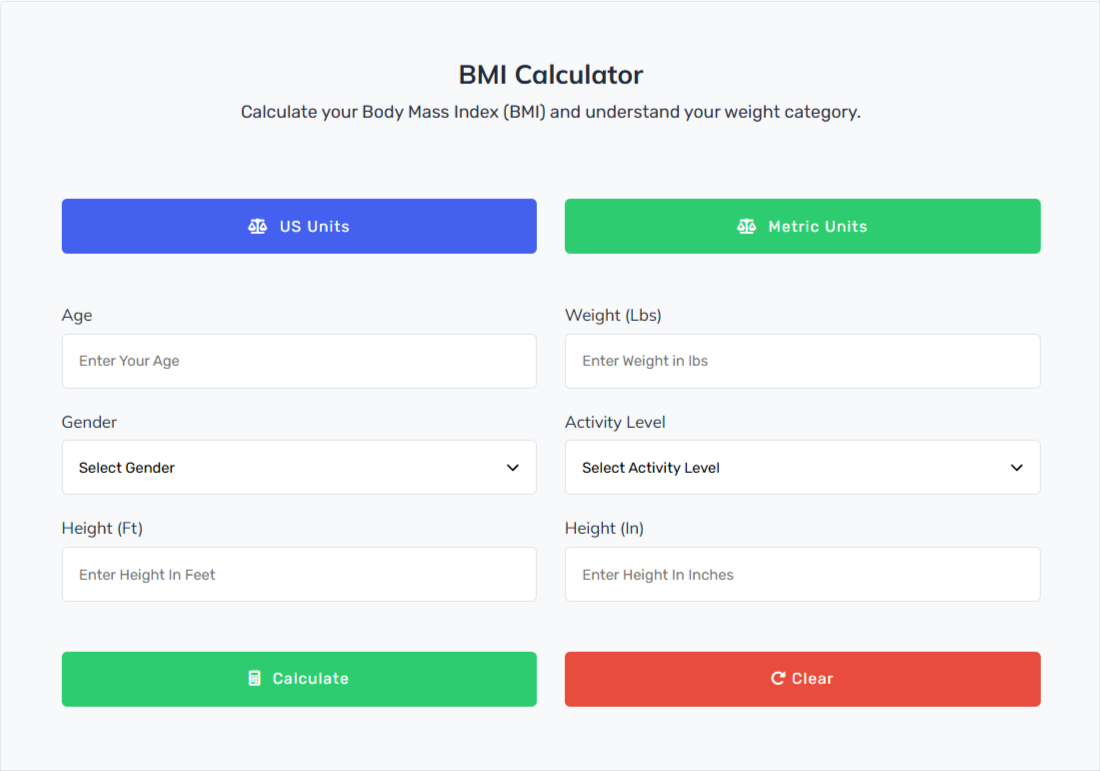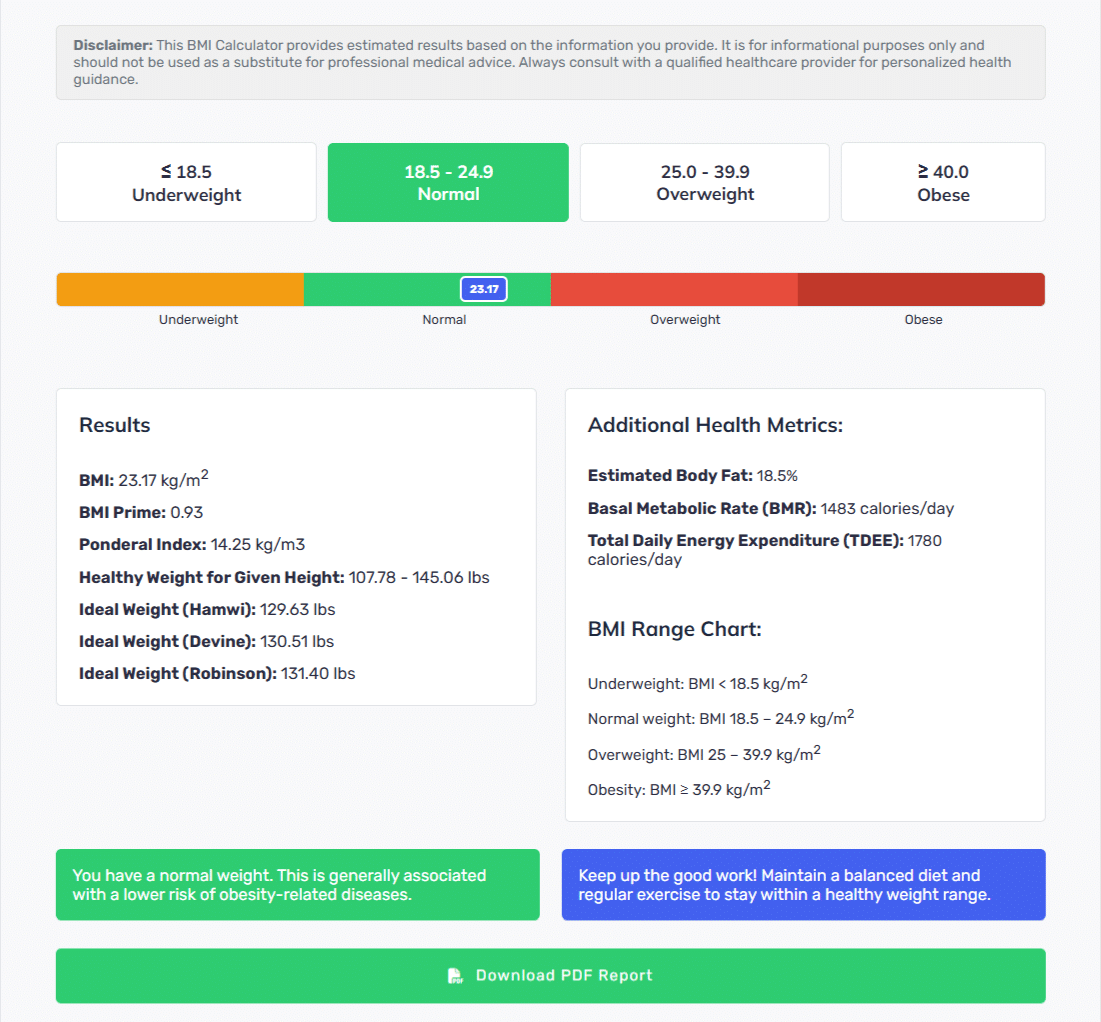BMI Calculator
Table of Contents
ToggleBMI Calculator: Find Your Ideal Weight & Health Insights with SahajTools
Are you curious about your Body Mass Index (BMI) and what it means for your health? Want to know if you’re in a healthy weight range or if it’s time to make some positive changes?
Look no further! Our free, easy-to-use BMI Calculator at SahajTools is here to help you quickly assess your Body Mass Index and gain valuable insights into your well-being. Whether you’re starting a new fitness journey, monitoring your health, or simply curious, our tool provides clear, actionable information.
Title
Message
BMI Calculator
Calculate your Body Mass Index (BMI) and understand your weight category.
Disclaimer: This BMI Calculator provides estimated results based on the information you provide. It is for informational purposes only and should not be used as a substitute for professional medical advice. Always consult with a qualified healthcare provider for personalized health guidance.
Results
BMI: kg/m2
BMI Prime:
Ponderal Index:
Healthy Weight for Given Height:
Ideal Weight (Hamwi):
Ideal Weight (Devine):
Ideal Weight (Robinson):
Additional Health Metrics:
Estimated Body Fat:
Basal Metabolic Rate (BMR): calories/day
Total Daily Energy Expenditure (TDEE): calories/day
BMI Range Chart:
Underweight: BMI < 18.5 kg/m2Normal weight: BMI 18.5 – 24.9 kg/m2Overweight: BMI 25 – 39.9 kg/m2Obesity: BMI ≥ 39.9 kg/m2What is BMI and Why Does it Matter?
BMI, or Body Mass Index, is a simple calculation that uses your height and weight to estimate if you’re in a healthy weight category. It’s a widely used screening tool for identifying potential weight problems for adults. While not a perfect measure of body fat, it’s a great starting point for understanding your general health status.
Why is knowing your BMI important?
Your BMI can indicate if you’re at an increased risk for certain health conditions associated with being underweight, overweight, or obese. These conditions can include heart disease, type 2 diabetes, high blood pressure, and more. Knowing your BMI empowers you to make informed decisions about your lifestyle and health goals.
How Does Our BMI Calculator Work?
Our SahajTools BMI Calculator is designed for simplicity and accuracy. Here’s how you can get your results in just a few clicks:
- Choose Your Units: Select between “US Units” (pounds and feet/inches) or “Metric Units” (kilograms and meters/centimeters).
- Enter Your Details:
- Age:Your age helps in providing more context to the results. (Curious about how old you are precisely? Try our Age Calculator!)
- Gender: While BMI calculation itself doesn’t directly use gender, it can influence ideal weight ranges and interpretations.
- Weight: Input your current weight.
- Height: Enter your height accurately.
- Activity Level: Select your typical activity level (Sedentary, Lightly Active, Moderately Active, Very Active, Extra Active). This helps our calculator provide more personalized health metrics like estimated daily calorie needs.
- Click “Calculate”: Our calculator instantly processes your information.
Understanding Your Personalized BMI Results
Our interactive results section goes beyond just a number. You’ll get a comprehensive breakdown to truly understand what your BMI means:
- Your BMI Score: A clear numerical value indicating your Body Mass Index.
- Dynamic Weight Indicator: See exactly where your current weight falls on a visual scale from “Underweight” to “Obese.”
- BMI Visualizer Bar: A colorful, easy-to-read bar that visually represents your BMI category.
- Result Summary: A concise overview of your weight status (e.g., “Normal Weight,” “Overweight”).
- BMI Range Chart: A helpful chart outlining the standard BMI categories:
- Underweight: BMI less than 18.5 kg/m²
- Normal Weight: BMI 18.5 – 24.9 kg/m²
- Overweight: BMI 25.0 – 29.9 kg/m²
- Obesity: BMI 30.0 kg/m² or greater
- Additional Health Metrics: Get deeper insights, including:
- Estimated Body Fat Percentage: An estimation of your body composition.
- Basal Metabolic Rate (BMR): The number of calories your body burns at rest.
- Total Daily Energy Expenditure (TDEE): The total calories you burn in a day, considering your activity level.
- Ideal Weight Ranges: See various ideal weight estimations (Hamwi, Devine, Robinson formulas) tailored to your height.
- Ponderal Index: Another metric that considers weight relative to the cube of height, often used for assessing thinness.
- Personalized Health Advice: Based on your result, you’ll receive simple, humanized advice to help you maintain a healthy weight or work towards a healthier lifestyle.
Beyond the Numbers: Important Considerations
While BMI is a valuable tool, it’s essential to remember its limitations:
- Muscle Mass: BMI doesn’t distinguish between muscle and fat. Athletes or very muscular individuals might have a high BMI but very little body fat.
- Age & Gender: Body composition changes with age, and men and women tend to store fat differently. (Please note: BMI calculators like ours are typically not suitable for pregnant women. If you’re expecting, you might find our Pregnancy Calculator helpful for tracking your journey.)
- Ethnicity: BMI cut-offs may need adjustment for certain ethnic groups.
- Body Composition: For a complete picture of your health, consider factors like waist circumference, body fat percentage, and overall lifestyle.
Always consult with a healthcare professional for personalized health advice and assessments. Our BMI calculator is a screening tool, not a diagnostic one.
Global Standard BMI Chart for Adults
| BMI Range (kg/m²) | Weight Status Category | Health Risk (General) |
| Less than 18.5 | Underweight | Increased |
| 18.5 – 24.9 | Normal Weight | Least |
| 25.0 – 29.9 | Overweight | Increased |
| 30.0 – 34.9 | Obesity Class I | High |
| 35.0 – 39.9 | Obesity Class II | Very High |
| 40.0 or greater | Obesity Class III | Extremely High |
How is BMI Calculated?
The formula for calculating BMI is:
Metric Units:
BMI = weight (kg)/height (m)2
(Weight in kilograms divided by height in meters squared)
US/Imperial Units:
BMI = weight (lbs) × 703/height (in)2
(Weight in pounds multiplied by 703, divided by height in inches squared)
Example:
If you weigh 70 kg and are 1.75 meters tall:
BMI = 70/(1.75)2
BMI = 70/3.0625
BMI ≈ 22.86 kg/m2
According to the chart, a BMI of 22.86 falls into the "Normal Weight" category.
Frequently Asked Questions (FAQs)
Yes, our BMI calculator is completely free for everyone to use!
Our calculator uses standard formulas to provide an accurate BMI based on your height and weight inputs. For health interpretation, it's a reliable screening tool.
No, this calculator is designed for adults (18 years and older). BMI interpretation for children and teenagers is different and requires growth charts specific to age and gender.
If your BMI falls into the underweight, overweight, or obese categories, it's a good idea to consult with a doctor or a registered dietitian. They can provide personalized advice on diet, exercise, and overall health strategies.
Yes! After calculating your BMI, you can click the "Download PDF Report" button to save or print a detailed summary of your results.
For most adults, checking your BMI a few times a year is sufficient to monitor your general weight status. If you're on a weight management journey, you might check it more frequently to track your progress, but remember that healthy changes take time.
While BMI is a useful indicator, it's just one piece of the health puzzle. It doesn't directly measure body fat or overall health. A healthy lifestyle involves many factors like diet, exercise, stress levels, and genetics. Always talk to a healthcare professional for a complete health assessment.
Yes, you can! The basic formula for BMI is weight in kilograms divided by the square of height in meters
. However, our online calculator does the math instantly for you, saving you time and ensuring accuracy!
The Ponderal Index is another measure of leanness or adiposity, calculated as weight divided by the cube of height
. It's often considered a better indicator than BMI for very short or very tall individuals, as it's less correlated with height. We've included it to give you a more complete picture, though BMI is the most commonly used standard.
It's great that you feel healthy! As mentioned, BMI is a screening tool. If you're very muscular (like athletes or bodybuilders), your BMI might be high because muscle weighs more than fat. However, if your high BMI is due to excess body fat, it's still worth discussing with a doctor to understand potential long-term health risks, even if you feel fine now.
Take Control of Your Health Today!
Take Control of Your Health Today! Understanding your BMI is the first step towards a healthier you. Use our SahajTools BMI Calculator now to get instant insights into your weight status. Remember, maintaining a balanced diet and regular exercise are key components of a healthy lifestyle. For global recommendations on maintaining a healthy lifestyle, you can refer to resources from the World Health Organization.

